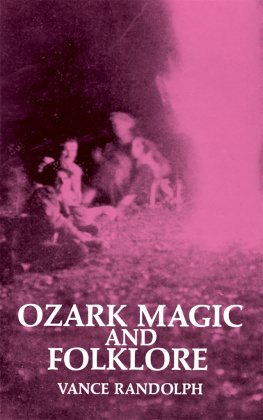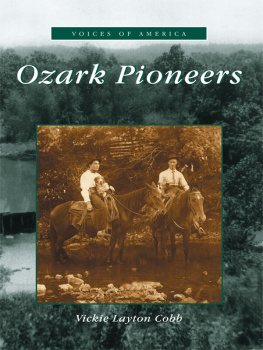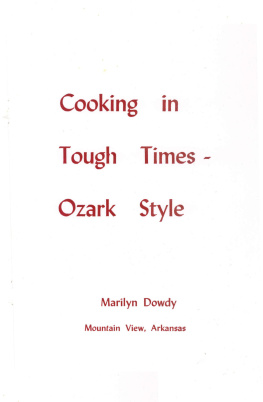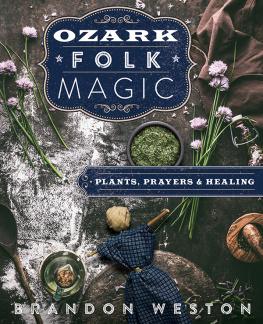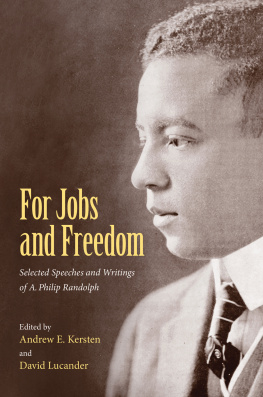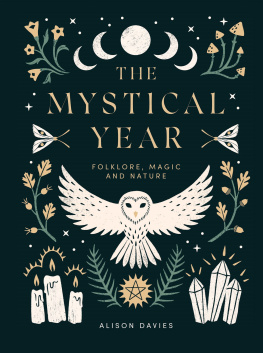Randolph - Ozark magic and folklore
Here you can read online Randolph - Ozark magic and folklore full text of the book (entire story) in english for free. Download pdf and epub, get meaning, cover and reviews about this ebook. City: New York, year: 2003, publisher: Dover Publications, genre: Romance novel. Description of the work, (preface) as well as reviews are available. Best literature library LitArk.com created for fans of good reading and offers a wide selection of genres:
Romance novel
Science fiction
Adventure
Detective
Science
History
Home and family
Prose
Art
Politics
Computer
Non-fiction
Religion
Business
Children
Humor
Choose a favorite category and find really read worthwhile books. Enjoy immersion in the world of imagination, feel the emotions of the characters or learn something new for yourself, make an fascinating discovery.
- Book:Ozark magic and folklore
- Author:
- Publisher:Dover Publications
- Genre:
- Year:2003
- City:New York
- Rating:3 / 5
- Favourites:Add to favourites
- Your mark:
- 60
- 1
- 2
- 3
- 4
- 5
Ozark magic and folklore: summary, description and annotation
We offer to read an annotation, description, summary or preface (depends on what the author of the book "Ozark magic and folklore" wrote himself). If you haven't found the necessary information about the book — write in the comments, we will try to find it.
Randolph: author's other books
Who wrote Ozark magic and folklore? Find out the surname, the name of the author of the book and a list of all author's works by series.
Ozark magic and folklore — read online for free the complete book (whole text) full work
Below is the text of the book, divided by pages. System saving the place of the last page read, allows you to conveniently read the book "Ozark magic and folklore" online for free, without having to search again every time where you left off. Put a bookmark, and you can go to the page where you finished reading at any time.
Font size:
Interval:
Bookmark:
OZARK MAGIC AND FOLKLORE
formerly titled Ozark Superstitions
formerly titled Ozark Superstitions
by
VANCE RANDOLPH
Dover Publications, Inc.
New York
Copyright 1947 by Columbia University Press.
All rights reserved.
This Dover edition, first published in 1964, is an unabridged and unaltered republication of the work originally published in 1947 by Columbia University Press under the title Ozark Superstitions. This edition is published by special arrangement with Columbia University Press.
Library of Congress Catalog Card Number: 64-18649
International Standard Book Number
ISBN-13: 978-0-486-21181-7
ISBN-10: 0-486-21181-9
Manufactured in the United States by Courier Corporation
21181921
www.doverpublications.com
TO THE MEMORY OF G. STANLEY HALL
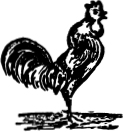 For obvious reasons it is not practicable to credit every item in this collection to the individual from whom it was obtained, as I have done in Ozark Folksongs and some of my other books. But for the sake of the record, I set down here the names of certain persons who have directly furthered my investigations. Among these must be listed Mrs. Anna Bacon, Galena, Mo.; Dr. Charles Hillman Brough, Little Rock, Ark.; Miss Nancy Clemens, Springfield, Mo.; Dr. George E. Hastings, Fayetteville, Ark.; Mr. Charles S. Hiatt, Cassville, Mo.; Mrs. Dorn Higgins, Sulphur Springs, Ark.; Mr. Earl Keithley, Day, Mo.; Mr. Lewis Kelley, Cyclone, Mo.; Mr. Maurice Lamberson, Bentonville, Ark.; Mr. Cass Little, Anderson, Mo.; Mr. Ernest Long, Joplin, Mo.; Mrs. May Kennedy McCord, Springfield, Mo.; Mrs. Mary Elizabeth Mahnkey, Mincy, Mo.; Mrs. Mabel E. Mueller, Rolla, Mo.; Mrs. Geraldine Parker, St. Louis, Mo.; Miss Rubey Poyner, Southwest City, Mo.; Mr. Otto Ernest Rayburn, Eureka Springs, Ark.; Dr. Oakley St. John, Pineville, Mo.; Mr. Clyde Sharp, Pack, Mo.; Mr. Elbert Short, Crane, Mo.; Mrs. Isabel Spradley, Van Buren, Ark.; Mr. Fred Starr, Greenland, Ark.; Mrs. Olga Trail, Farmington, Ark.; Mrs. Ruth H. Tyler, Neosho, Mo.; Mr. John Turner White, Jefferson City, Mo.; Mrs. Marie Wilbur, Pineville, Mo.; and Dr. J. H. Young, Galena, Mo. I wish to acknowledge my indebtedness to these people, but they are in no way responsible for my interpretation of the material, nor for the general character of the book.
For obvious reasons it is not practicable to credit every item in this collection to the individual from whom it was obtained, as I have done in Ozark Folksongs and some of my other books. But for the sake of the record, I set down here the names of certain persons who have directly furthered my investigations. Among these must be listed Mrs. Anna Bacon, Galena, Mo.; Dr. Charles Hillman Brough, Little Rock, Ark.; Miss Nancy Clemens, Springfield, Mo.; Dr. George E. Hastings, Fayetteville, Ark.; Mr. Charles S. Hiatt, Cassville, Mo.; Mrs. Dorn Higgins, Sulphur Springs, Ark.; Mr. Earl Keithley, Day, Mo.; Mr. Lewis Kelley, Cyclone, Mo.; Mr. Maurice Lamberson, Bentonville, Ark.; Mr. Cass Little, Anderson, Mo.; Mr. Ernest Long, Joplin, Mo.; Mrs. May Kennedy McCord, Springfield, Mo.; Mrs. Mary Elizabeth Mahnkey, Mincy, Mo.; Mrs. Mabel E. Mueller, Rolla, Mo.; Mrs. Geraldine Parker, St. Louis, Mo.; Miss Rubey Poyner, Southwest City, Mo.; Mr. Otto Ernest Rayburn, Eureka Springs, Ark.; Dr. Oakley St. John, Pineville, Mo.; Mr. Clyde Sharp, Pack, Mo.; Mr. Elbert Short, Crane, Mo.; Mrs. Isabel Spradley, Van Buren, Ark.; Mr. Fred Starr, Greenland, Ark.; Mrs. Olga Trail, Farmington, Ark.; Mrs. Ruth H. Tyler, Neosho, Mo.; Mr. John Turner White, Jefferson City, Mo.; Mrs. Marie Wilbur, Pineville, Mo.; and Dr. J. H. Young, Galena, Mo. I wish to acknowledge my indebtedness to these people, but they are in no way responsible for my interpretation of the material, nor for the general character of the book.
Some of the preliminary studies upon which this volume is based were printed as early as 1927, in the Journal of American Folklore. My books The Ozarks and Ozark Mountain Folks, published by the Vanguard Press in 1931 and 1932, contained accounts of backwoods folk belief. Many supernatural narratives, and some notes on water witching, first appeared in Ozark Ghost Stories and Tall Tales from the Ozarks, published and copyrighted by E. Haldeman-Julius, of Girard, Kansas. Several yarns about witchcraft were printed in Folk-Say, a regional annual edited by B. A. Botkin and brought out by the University of Oklahoma Press; other related items first saw the light in the quarterly University Review, published at the University of Kansas City. I am grateful to the owners of these copyrights for permission to reprint the material here.
V. R.
Galena, Missouri
June 10, 1946
 Contents
ContentsOZARK MAGIC AND FOLKLORE
formerly titled Ozark Superstitions
 The people who live in the Ozark country of Missouri and Arkansas were, until very recently, the most deliberately unprogressive people in the United States. Descended from pioneers who came West from the Southern Appalachians at the beginning of the nineteenth century, they made little contact with the outer world for more than a hundred years. They seem like foreigners to the average urban American, but nearly all of them come of British stock, and many families have lived in America since colonial days. Their material heirlooms are few, but like all isolated illiterates they have clung to the old songs and obsolete sayings and outworn customs of their ancestors.
The people who live in the Ozark country of Missouri and Arkansas were, until very recently, the most deliberately unprogressive people in the United States. Descended from pioneers who came West from the Southern Appalachians at the beginning of the nineteenth century, they made little contact with the outer world for more than a hundred years. They seem like foreigners to the average urban American, but nearly all of them come of British stock, and many families have lived in America since colonial days. Their material heirlooms are few, but like all isolated illiterates they have clung to the old songs and obsolete sayings and outworn customs of their ancestors.
Sophisticated visitors sometimes regard the hillbilly as a simple child of nature, whose inmost thoughts and motivations may be read at a glance. Nothing could be farther from the truth. The hillman is secretive and sensitive beyond anything that the average city dweller can imagine, but he isnt simple. His mind moves in a tremendously involved system of signs and omens and esoteric auguries. He has little interest in the mental procedure that the moderns call science, and his ways of arranging data and evaluating evidence are very different from those currently favored in the world beyond the hilltops. The Ozark hillfolk have often been described as the most superstitious people in America. It is true that some of them have retained certain ancient notions which have been discarded and forgotten in more progressive sections of the United States.
It has been said that the Ozarker got his folklore from the Negro, but the fact is that Negroes were never numerous in the hill country, and there are many adults in the Ozarks today who have never even seen a Negro. Another view is that the hillmans superstitions are largely of Indian origin, and there may be a measure of truth in this; the pioneers did mingle freely with the Indians, and some of our best Ozark families still boast of their Cherokee blood. My own feeling is that most of the hillmans folk beliefs came with his ancestors from England or Scotland. I believe that a comparison of my material with that recorded by British antiquarians will substantiate this opinion.
The collection of some types of folkloreriddles, party games, or folksongs, for exampleis a comparatively easy matter, even in the Ozark country. If a hillman knows an old ballad or game song any reasonably diplomatic collector can induce him to sing it, or at least to recite the words. But the mention of superstition raises the question of ones personal beliefa matter which the Ozarker does not care to discuss with furriners. The stranger who inquires about love charms or witchcraft will meet only blank looks and derisive laughter.
Authentic data in this field cannot be gathered by running Old-Timer columns in newspapers, because the people who contribute to such columns are not typical backwoods folk at all; the real old-timers seldom read newspapers, much less write letters for publication. The questionnaire method, too, has been tried at our whistle-stop colleges and among rural schoolmarms without any conspicuous success. The man who wants to study the Ozark superstitions must live with the Ozark people year after year and gradually absorb folklore through the rind, as it were. The information obtained in this manner is more trustworthy, in my opinion, than that elicited by any sort of direct questioning.
I first visited the Ozark country in 1899, and since 1920 I have spent practically all of my time here, living in many parts of the region, sometimes in the villages and sometimes in the wildest and most isolated hollers. I fished and fought and hunted and danced and gambled with my backwoods neighbors ; I traveled the ridge roads in a covered wagon, consorting with peddlers and horse traders and yarb doctors and moonshiners; I learned to chew tobacco, and dabbled in village politics, and became a deputy sheriff, and solicited local items for the newspapers. By marriage and otherwise I associated myself with several old backwoods families, in both Missouri and Arkansas. I spared no effort to become intimately acquainted with Ozarkers of the hillbilly type, and succeeded insofar as such intimacy is possible to one who was born a lowlander.
Next pageFont size:
Interval:
Bookmark:
Similar books «Ozark magic and folklore»
Look at similar books to Ozark magic and folklore. We have selected literature similar in name and meaning in the hope of providing readers with more options to find new, interesting, not yet read works.
Discussion, reviews of the book Ozark magic and folklore and just readers' own opinions. Leave your comments, write what you think about the work, its meaning or the main characters. Specify what exactly you liked and what you didn't like, and why you think so.

